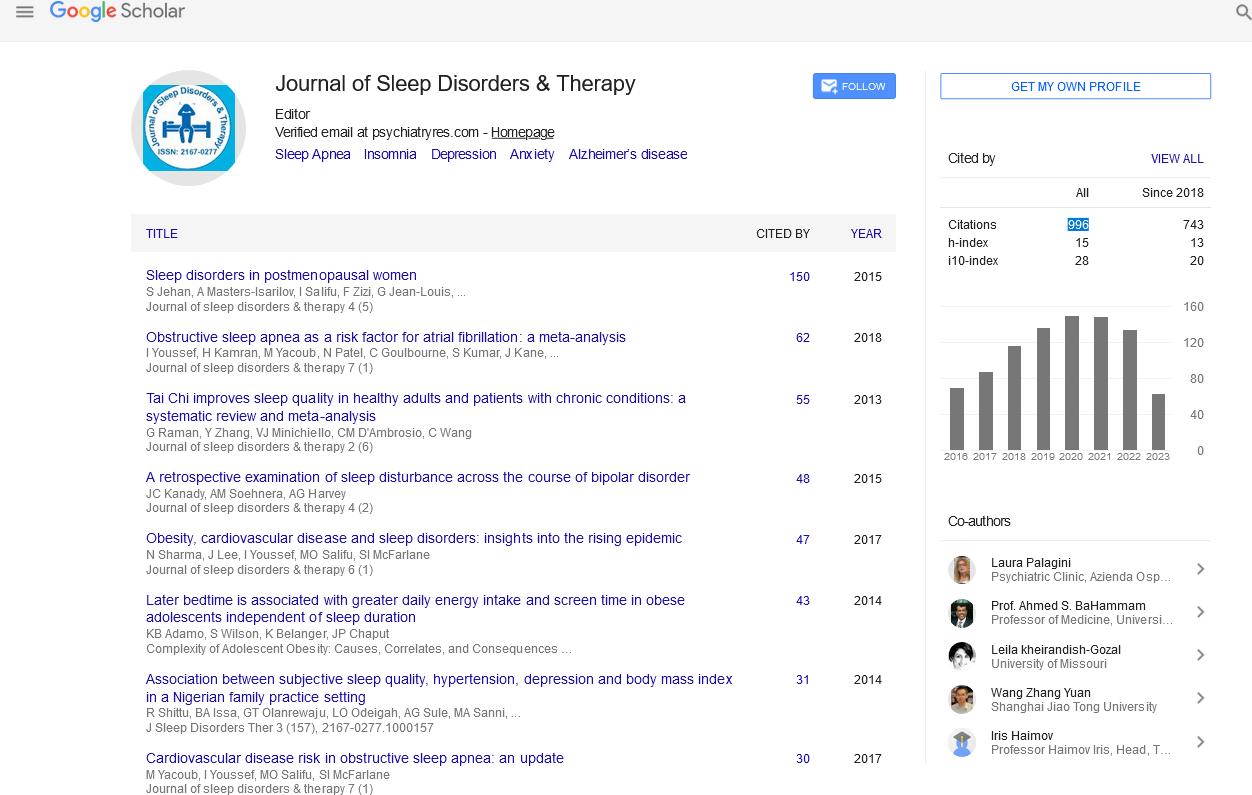Journal of Sleep Disorders & Therapy : Citations & Metrics Report
Articles published in Journal of Sleep Disorders & Therapy have been cited by esteemed scholars and scientists all around the world. Journal of Sleep Disorders & Therapy has got h-index 15, which means every article in Journal of Sleep Disorders & Therapy has got 15 average citations.
Following are the list of articles that have cited the articles published in Journal of Sleep Disorders & Therapy.
| 2024 | 2023 | 2022 | 2021 | 2020 | 2019 | 2018 | 2017 | 2016 | 2015 | 2014 | 2013 | |
|---|---|---|---|---|---|---|---|---|---|---|---|---|
Total published articles |
123 | 110 | 61 | 48 | 18 | 8 | 22 | 29 | 39 | 52 | 36 | 54 |
Research, Review articles and Editorials |
6 | 12 | 3 | 33 | 14 | 8 | 17 | 22 | 29 | 37 | 38 | 44 |
Research communications, Review communications, Editorial communications, Case reports and Commentary |
65 | 98 | 36 | 13 | 4 | 0 | 5 | 3 | 10 | 11 | 6 | 10 |
Conference proceedings |
0 | 0 | 0 | 0 | 0 | 0 | 0 | 0 | 26 | 43 | 0 | 0 |
Citations received as per Google Scholar, other indexing platforms and portals |
102 | 114 | 135 | 152 | 155 | 138 | 115 | 89 | 68 | 27 | 16 | 14 |
| Journal total citations count | 966 |
| Journal impact factor | 2.9 |
| Journal 5 years impact factor | 4.7 |
| Journal cite score | 5.1 |
| Journal h-index | 15 |
| Journal h-index since 2019 | 13 |
Important citations (510)
Murdock kk, horissian m, crichlow-ball c (2016) emerging adults’ text message use and sleep characteristics: a multimethod, naturalistic study. behavioral sleep medicine 18: 1-4. |
|
Gijselaers hj, elena b, kirschner pa, de groot rh (2016) physical activity, sleep, and nutrition do not predict cognitive performance in young and middle-aged adults. frontiers in psychology 7. |
|
Gijselaers hj, kirschner pa, de groot rh (2015) chronotype, sleep quality and sleep duration in adult distance education: not related to study progress. learning and individual differences 44: 46-52. |
|
Sexton-radek k, hartley a (2013) college residential sleep environment. psychological reports 113: 903-907. |
|
Sargent p (2015) mental health care of special operations forces. inposttraumatic stress disorder and related diseases in combat veterans (pp. 311-329) springer international publishing. |
|
Weber m, killgore wd. what are the emerging therapeutic uses of bright light therapy for neurological disorders? future neurology 8: 495-497. |
|
Killgore wd (2015) a model for predicting cognitive and emotional health from structural and functional neurocircuitry following traumatic brain injury. arizona univ tucson. |
|
Kurna vk (2016) a review on traumatic brain injury, diagnosis and its treatment. rroijmhs 23: 24. |
|
Mollayeva t (2014) study of sleep patterns might advance our knowledge on alertness in traumatic brain injury. j sleep disorders ther 3: 2167-0277. |
|
Tkachenko n, singh k, hasanaj l, serrano l, kothare sv (2016) sleep disorders associated with mild traumatic brain injury using sport concussion assessment tool 3. pediatric neurology 57: 46-50. |
|
Sullivan ka, edmed sl, allan ac, karlsson lj, smith ss (2015) characterizing self-reported sleep disturbance after mild traumatic brain injury. journal of neurotrauma 32: 474-486. |
|
dimitriou d, karmiloff-smith a, ashworth a, hill cm. impaired sleep-related learning in children with williams syndrome. pediatrics research international journal. 2013:1-0. |
|
Halász p, bódizs r, parrino l, terzano m (2016) psychophysiology and chronobiology research group. psychophysiology 18: 31. |
|
Dimitriou d, karmiloff-smith a, ashworth a, hill cm (2013) impaired sleep-related learning in children with williams syndrome. pediatrics research international journal 2013: a1-a10. |
|
Shyamsunder r, ch bp (2016) neuropharmacology and translational neuroscience: a review literature. rroijpps 5: 114-110 |
|
Bódizs r, gombos f, gerván p, szÃ?â??cs k, réthelyi jm, et al. (2014) aging and sleep in williams syndrome: accelerated sleep deterioration and decelerated slow wave sleep decrement. research in developmental disabilities 35: 3226-3235. |
|
Basner rc (2015) “nocturnal” noninvasive ventilation: an overview. innocturnal non-invasive ventilation 2015 (pp. 1-26) springer us. |
|
Fermin am, afzal u, culebras a (2016) sleep in neuromuscular diseases. sleep medicine clinics 11:53-64. |
|
UrbaÃ?â??czuk m, kiciÃ?â??ski p, dybaÃ?â??a a, myÃ?â?ºliÃ?â??ski w, mosiewicz j, et al. czynniki wpÃ?â??ywajÃ?â?¦ce na stÃ?â?¢Ã?¼enie troponiny t u pacjentów z zespoÃ?â??em obturacyjnego bezdechu sennego. |
|
UrbaÃ?â??czuk m, kiciÃ?â??ski p, dybaÃ?â??a a, myÃ?â?ºliÃ?â??ski w, mosiewicz j, et al. (2016) factors influencing troponin t concentration in patients with obstructive sleep apnea syndrome. folia cardiologica 11: 372-376. |
|
